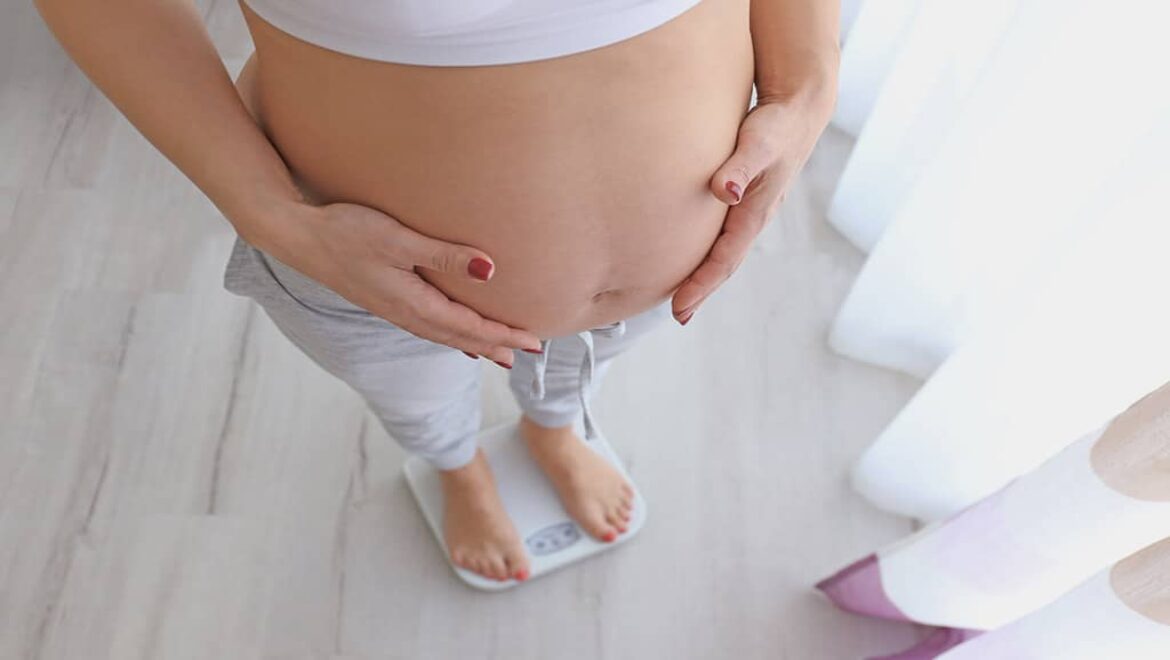
Whenever we picture pregnancy, we think of new bouncing babies and happy pregnancy glows.
We also picture weight gain. But, what happens if you aren’t gaining as much weight as you should be?
A lot of women worry about putting on too much weight when they’re pregnant or how they’re going to lose it after they have delivered.
We don’t tend to focus on what happens if the weight isn’t coming our way.
It is a good thing? Not really, but there are some common reasons why it isn’t happening, and ways to change it.
Why You’re Not Gaining Weight During Pregnancy
If you are in your first trimester and you’re not noticing the scales moving upwards, this isn’t the time to worry.
Your baby is so small at this point that his or her calorie requirements are tiny.
As you move through your pregnancy your baby’s requirements will increase, and you will need to have that weight gain to keep both of you healthy.
If you are at all concerned about your weight gain, it’s a good idea to have a chat with your doctor or midwife.
Very often it is a simple issue which can be rectified.
Commonly, morning sickness can decrease appetite.
Sometimes, a small change in your diet a little may be necessary to deal with the growing caloric needs of you and your baby.
After that, you’ll see the scales rising. This is possibly the only time in your life when you’ll be happy to see a heavier weight!
Here are a few things to try.
Opt For Foods Which Are Classed as ‘Calorie-Dense’
No idea what that is? They are healthy foods that are high in calories.
Some examples include seeds, nuts, yogurt, milk, cheese (full-fat dairy), salmon, legumes, avocados, and whole grain pasta.
These high-calorie foods are high in nutrients, vitamins, and minerals.
They’re going to keep you fuller for longer and give you the energy you need to get through your day.
We all know that pregnancy is an exhausting time, so you’ll need those calories to keep you moving.
Conversely, junk food such as fast food and takeaways are also classed as “calorie-dense”, but you need to avoid these.
Eating a few burgers will put the weight on but not in the right way!
These types of food pack in the calories but they don’t have the nutrition to back it up. They’re basically wasted calories.
Eat Small Meals, More Often
It could be that you’re not eating frequently enough which may cause your body to think it’s actually starving. Most of us are guilty of this at some point.
During pregnancy, it’s vital that you eat small meals on a regular basis.
For instance, five or six light meals are better than breakfast and then one huge dinner.
You’re not meeting your energy requirements from that and your baby is missing out on nutrients in-between.
By having these smaller, more frequent meals, he or she is getting a constant supply of vitamins and minerals.
Sort Out Your Morning Sickness
One of the most common reasons for not putting on weight in pregnancy is due to nausea or vomiting.
By the time you enter your second trimester, your morning sickness should abate.
If it doesn’t or if you haven’t reached that point yet, here are some things that might help.
If it’s just nausea which is bothering you, try these handy hints:
- Avoid missing meals and becoming too hungry – eat little and often
- Try something containing ginger, like ginger tea or cookies. Ginger is great for nausea.
- Drink plenty of water, whether you’re actually vomiting or not
If nausea, vomiting, or a combination of the two is really an issue for you, then it’s a good idea to have a chat with your doctor or midwife.
They may be able to give you some medication to help combat the problem.
From there, your appetite should return and the weight issue disappear.
Are You Suffering From Increased Sensitivities?
Pregnancy can increase sensitivity to certain smells and tastes. This can impact appetite quite drastically.
Are there are certain things which are putting you off eating? Is there a smell which makes you want to be sick? A taste which you keep remembering and you simply can’t eat because of it?
Keep a diary of these symptoms and try your best to avoid these triggers.
Also, be reassured that such sensitivities should fade as your pregnancy progresses.
If you are still not gaining not much weight as your first trimester starts to come to an end, have a chat with your doctor or midwife for some advice.
For the most part, it’s about changing your nutritional needs and habits.
After that, everything should sort itself out, but it’s never a bad idea just to check.
Not enough attention is given to women who struggle to actually gain weight. We tend to focus on those who find it too easy to gain.
Not gaining weight during pregnancy isn’t that common, but it is still an issue for some women.
The good news is that as that first trimester ends, most of the problems will resolve themselves.
Sources:
- https://medlineplus.gov/ency/patientinstructions/000617.htm
- https://americanpregnancy.org/pregnancy-health/eating-for-two/
- https://www.webmd.com/baby/guide/healthy-weight-gain#1
- https://news.sanfordhealth.org/womens/the-healthy-way-to-gain-weight-during-pregnancy/
- https://www.cdc.gov/reproductivehealth/maternalinfanthealth/pregnancy-weight-gain.htm
- https://www.healthyfamiliesbc.ca/home/articles/weight-gain-during-pregnancy-trimester
- https://www.mayoclinic.org/healthy-lifestyle/pregnancy-week-by-week/in-depth/pregnancy-weight-gain/art-20044360
